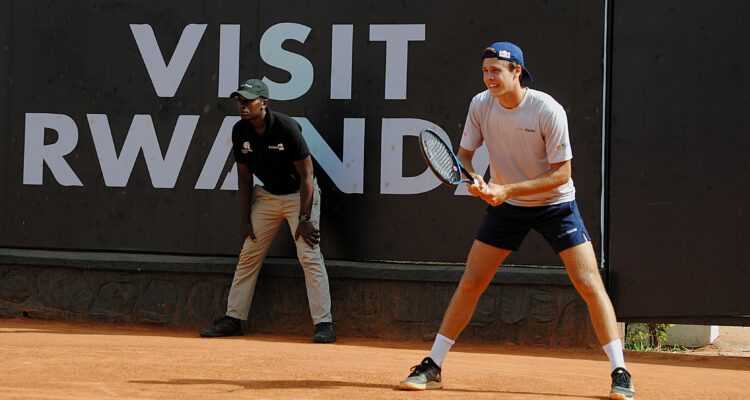KIGALI, March 5, 2025
At just 19 years old, Joel Schwaerzler is considered one of the most promising talents in Austrian tennis. Following a successful junior career, the young player from Vorarlberg is now fully focused on the professional circuit. At the end of last year, Schwaerzler announced his decision to part ways with the Austrian Tennis Federation and, from this season onwards, to practice at the academy of Juan Ozón-Llácer in Barcelona.
At the Rwanda Challenger in Kigali, Schwaerzler gained further valuable experience against established players—most notably, in the first week of the ATP Challenger Tour tournament series in Central Africa, he battled compatriot Maximilian Neuchrist in a hard-fought three-set match.
In this interview, the rising star talks about his impressions of Kigali, his start to the season, and his collaboration with his new coach.
Tennis TourTalk: Joel, this is certainly not an everyday setting for an interview. We’re in Kigali, Rwanda. What are your impressions?
Joel Schwaerzler: This is definitely not the place I imagined giving an interview! (laughs) My first impression was very positive. It’s incredibly green here, which I didn’t expect in Central Africa, as I thought it would be much drier. But it’s truly beautiful. The tournament organization is excellent as well. You can tell that they want to achieve something positive with the event, which benefits the players. Overall, it’s been a very good experience.
What made you decide to compete in the two-week Rwanda Challenger?
I wanted to play on clay, and the tournaments in Europe don’t start until next week. It’s a longer journey, but I thought the altitude here might suit me. The first week wasn’t great, but if I can put my game together, I can head home—or rather, to Barcelona, which is a bit of a new experience for me (laughs)—with a positive feeling.
Speaking of Barcelona, you announced at the end of last year that your training setup would be changing. What led to that decision?
I decided to try something new, and I chose Juan Ozón-Llácer’s academy. There’s an entire team of coaches there, but Juan is responsible for me and the one who trains with me on the court. Everything is going well, and I’m happy. We have developed a good connection and set clear goals. We are working hard together to achieve them.
This year, I want to improve my level and reach the qualifying of the Grand Slam events. The past six months have been tough. Parting ways with the federation wasn’t easy because I didn’t have a replacement lined up. I was able to train with Günter Bresnik until the end of the season, which helped me a lot. But now I fully stand by my decision to work with Juan. At the end of my career, we’ll see if it was the right one.
Do you work with a mental coach?
Not really. I think I can handle it myself at the moment. I tried it once, but ultimately, it’s up to me to deliver my best performance.
Sieh dir diesen Beitrag auf Instagram an
You started your season in South America. Was that influenced by your new Spanish training environment?
No. The main reason was that I wanted to start on clay, and the tournaments there have very strong fields. I wanted to play at a high level and get in as many matches as possible. That’s better than playing Futures tournaments in the middle of nowhere and reaching the semifinals every week. I wanted to compete at the highest level I could. My results weren’t spectacular, but I had a solid swing. I lost my last match in a close battle, but overall, those four weeks were very positive.
It was also my first time in South America, and I visited some beautiful countries. The atmosphere was amazing, and despite a few losses, I really enjoyed the experience.
How are your Spanish skills coming along?
Not great yet! (laughs) I listen and understand a bit, but maybe I need to download a language app and cut back on Netflix. It’s a beautiful language that I’ve always wanted to learn, so I hope I can push myself to invest some time in it.
There was an opportunity to go on a safari in Rwanda. Did you take part?
I didn’t go on the safari because I’ve already had the experience in South Africa. If other Austrians had gone, I probably would have joined them. Seeing the animals is always incredible, and spending time with friends on a day off is great, too. But we were still playing doubles, so it didn’t quite fit into the schedule.
You were born in South Africa. Does being in Rwanda give you any sense of homecoming?
Rwanda is in Africa, but it’s quite different and still far from South Africa. I was on vacation in South Africa last year, and I do miss it a bit. Nothing compares to home. If I could, I’d love to travel further south from here—but only once my work for the season is done.
Best of luck, and thank you!
Interview: Florian Heer






